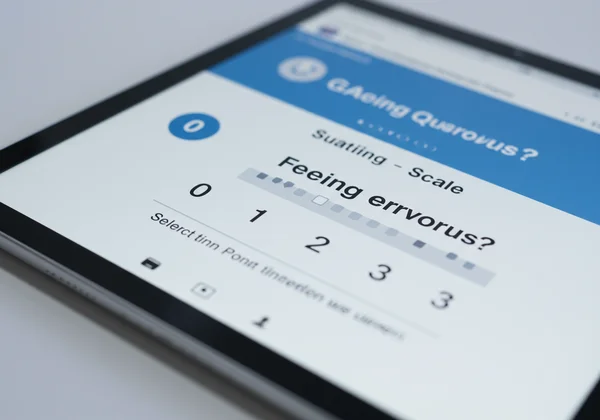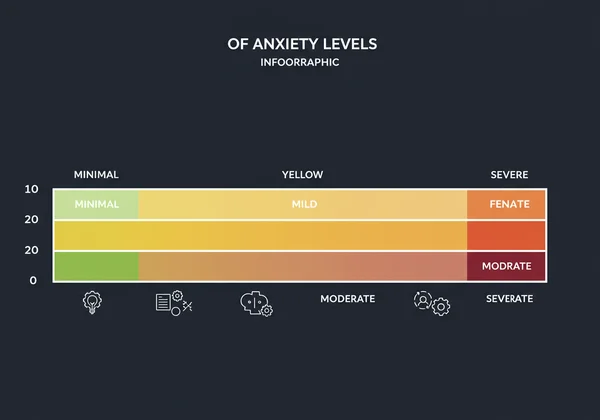Anxiety Test Score: GAD-7 Scale & Your Results Explained
July 21, 2025 | By Isla Caldwell
Taking an anxiety test can be a powerful first step toward understanding your mental well-being. But once you have a number, what does it actually mean? If you've ever asked, How can I test myself for anxiety? and then found yourself staring at a result, you're not alone. This guide is here to demystify the numbers, specifically by explaining the GAD-7 scale—a trusted tool used worldwide to measure anxiety symptoms.
Understanding your anxiety score isn't about getting a label; it's about gaining clarity. It provides a starting point, a piece of data that can help you map out your next steps. Whether your goal is self-reflection or preparing for a conversation with a professional, knowing what your score signifies is crucial. Let's decode the results together and empower you with knowledge. Ready to gain some insight? You can always get your score with our free and confidential test.
What is the GAD-7 Scale?
The Generalized Anxiety Disorder 7 (GAD-7) is a self-administered questionnaire used by healthcare professionals and researchers as a screening tool. It consists of seven questions that gauge the severity of common anxiety symptoms over the past two weeks. Its name comes from its purpose: to help screen for Generalized Anxiety Disorder (GAD), though its usefulness extends to panic disorder, social anxiety, and PTSD.
This isn't just another online quiz; it's a scientifically validated instrument. Its brevity and accuracy have made it a global standard for an initial anxiety assessment. When you use a reliable tool based on the GAD-7, you're using a method trusted by doctors to open a conversation about mental health.
Why the GAD-7 is Used for Anxiety Assessment
The GAD-7 is a go-to tool for anxiety assessment for several key reasons. First, it is highly reliable and has been validated in numerous clinical studies. This means its results are consistent and accurately reflect a person's symptom severity. Second, its simplicity makes it incredibly accessible. In just a few minutes, it provides a clear snapshot of your current state.
Furthermore, it’s not just a "yes or no" checklist. The scale measures the frequency of symptoms, offering a nuanced view of your experience. This helps differentiate between a fleeting moment of stress and a more persistent pattern of anxiety that might warrant further attention. This is why our confidential self-assessment is built upon this trusted framework.
How the GAD-7 Questions Measure Your Anxiety
Each of the seven questions on the GAD-7 corresponds to a core anxiety symptom. These include feeling nervous, not being able to stop worrying, worrying too much about different things, and trouble relaxing. You rate how often you've been bothered by each symptom on a 4-point scale:
- 0: Not at all
- 1: Several days
- 2: More than half the days
- 3: Nearly every day
The scores for each question are added together to produce a total score ranging from 0 to 21. This total score is what determines your anxiety level, providing a quantitative measure of your subjective feelings.

Interpreting Your Anxiety Score & What It Means
Receiving your anxiety score is the first step; the next is understanding it. A number on its own is just data. But when you interpret your anxiety test results, that data transforms into meaningful insight. It can validate your feelings and provide a clear, objective reference point for your mental state.
Think of it like a weather report for your mind. It tells you the current conditions, helping you decide whether you need to seek shelter, grab an umbrella, or just enjoy the day. The score isn't a final judgment but a helpful guide. Our online anxiety test gives you this score instantly and confidentially.
Understanding Anxiety Level Ranges
Your total GAD-7 score falls into one of four key ranges. Each range corresponds to a different anxiety level, helping to categorize the severity of your symptoms. These benchmarks are widely used by clinicians to guide their next steps.
Here’s a standard breakdown of the GAD-7 score ranges:
-
0-4: Minimal Anxiety. A score in this range suggests that the symptoms you're experiencing are likely not significant enough to cause major disruption in your daily life.
-
5-9: Mild Anxiety. This indicates the presence of mild anxiety symptoms. While manageable, they may be causing some distress. This is a good time for self-awareness and implementing positive coping strategies.
-
10-14: Moderate Anxiety. Scores in this range suggest that anxiety symptoms are frequent and are likely impacting your daily functioning. It is often recommended to discuss these symptoms with a healthcare professional.
-
15-21: Severe Anxiety. A score here points to frequent and pervasive anxiety symptoms that are likely causing significant impairment. Seeking professional evaluation and support is strongly advised.

What Different Score Ranges Imply for Your Well-being
Each score range offers a clue about how anxiety may be affecting you. A minimal score might mean your recent stress is situational and passing. A mild score could be a signal to pay closer attention to your stress levels and practice self-care, like mindfulness or exercise.
A moderate score is a more significant flag. It might mean that worry is making it hard to concentrate at work or that physical symptoms like restlessness are affecting your sleep. This is often the point where a conversation with a doctor or therapist can be incredibly beneficial. A severe score indicates that anxiety is likely a major disruptive force in your life, and professional help is a critical step toward managing it.
How Accurate is an Online Anxiety Test?
This is a vital question. How accurate is an online anxiety test? When an online anxiety test, based on a clinically validated scale like the GAD-7, it serves as a highly reliable screening tool. "Screening tool" is the key phrase here. It is designed to identify individuals who may be at risk and would benefit from further evaluation.
It is not a diagnostic tool. A formal diagnosis of an anxiety disorder can only be made by a qualified healthcare professional after a comprehensive assessment. However, a score from a GAD-7 test provides an excellent, scientifically-backed starting point for that conversation. It gives you concrete information to share with a doctor, making that first discussion much easier.
Beyond the Score: Your Next Steps & Support
Your score is a signpost, not a destination. Its true value lies in what you do with the information. Whether your score is low or high, it empowers you to take the next step on your mental wellness journey. This is where you move from understanding to action.
The goal is to use this insight to build resilience and develop effective strategies for managing your feelings. Remember, knowledge is power, and you now have a clearer understanding of your experience. To explore your results more deeply, our platform offers unique AI-powered insights that suggest personalized next steps.
Actionable Insights Based on Your Anxiety Level
Based on your score from a GAD test, here are some potential next steps:
- Minimal to Mild (0-9): Focus on proactive mental wellness. This could include journaling to understand your triggers, practicing daily mindfulness or deep-breathing exercises, ensuring regular physical activity, and maintaining a balanced diet.
- Moderate (10-14): Consider this a prompt to seek more information and support. In addition to the strategies above, this is an ideal time to schedule an appointment with a general practitioner or a mental health professional to discuss your score.
- Severe (15-21): Prioritize seeking professional help. Contact a doctor, therapist, or psychiatrist. Your score is a clear indicator that your symptoms are significantly impacting your life, and professional treatment can make a substantial difference.
When to Consider Professional Help for Anxiety
Regardless of your score, if anxiety is interfering with your happiness, work, relationships, or ability to function day-to-day, it is always a good idea to speak with a professional. A high score on an anxiety level test is a strong indicator, but your personal experience is the most important factor.
Look for signs like avoiding social situations you once enjoyed, experiencing persistent physical symptoms like a racing heart or stomach issues, or feeling that worry is uncontrollable. These are all valid reasons to seek support. Taking a free anxiety test can give you the confidence and data to start that important conversation.

Empowering Your Understanding: Taking the Next Step with Your Anxiety Score
With a clearer understanding of your anxiety score and the GAD-7 scale, you're now empowered to take meaningful steps toward managing your mental well-being. This knowledge is a powerful tool, transforming uncertainty into actionable insight.
Ready to transform your understanding into action? Discover your personal anxiety insights today. Take your free, confidential anxiety test now. In less than three minutes, our unique AI analysis will provide more than just a score—it offers deeper insights into your strengths, challenges, and actionable steps to guide your journey.
Frequently Asked Questions About Anxiety Test Scores
What is the GAD7 scale?
The GAD-7 is a 7-question, clinically validated screening tool used to measure the severity of generalized anxiety symptoms. It scores users on a scale of 0-21 to help identify minimal, mild, moderate, or severe anxiety levels, serving as a first step in understanding one's mental state.
How accurate is an online anxiety test like the GAD-7?
When based on the GAD-7, an online test is a very accurate screening tool. It reliably indicates the severity of symptoms. However, it is not a substitute for a formal diagnosis from a healthcare professional, who can assess the full context of your situation.
What should I do if my anxiety score is high?
A high score (typically 15 or above) is a strong signal to prioritize your mental health. It is highly recommended that you schedule an appointment with a doctor or mental health therapist to discuss your results. They can provide a comprehensive evaluation and create a treatment plan. Our online tool can be the first step in gathering information for that conversation.
Does a high GAD-7 score mean I have an anxiety disorder?
Not necessarily. A high score indicates that you are experiencing significant anxiety symptoms that warrant a professional evaluation. Only a qualified clinician can diagnose an anxiety disorder after considering many factors. The test is a starting point for that conversation, not a conclusion.
Disclaimer: This article is for informational purposes only and does not constitute medical advice. The GAD-7 is a screening tool, not a diagnostic instrument. Please consult a qualified healthcare professional for any health concerns or before making any decisions related to your health.